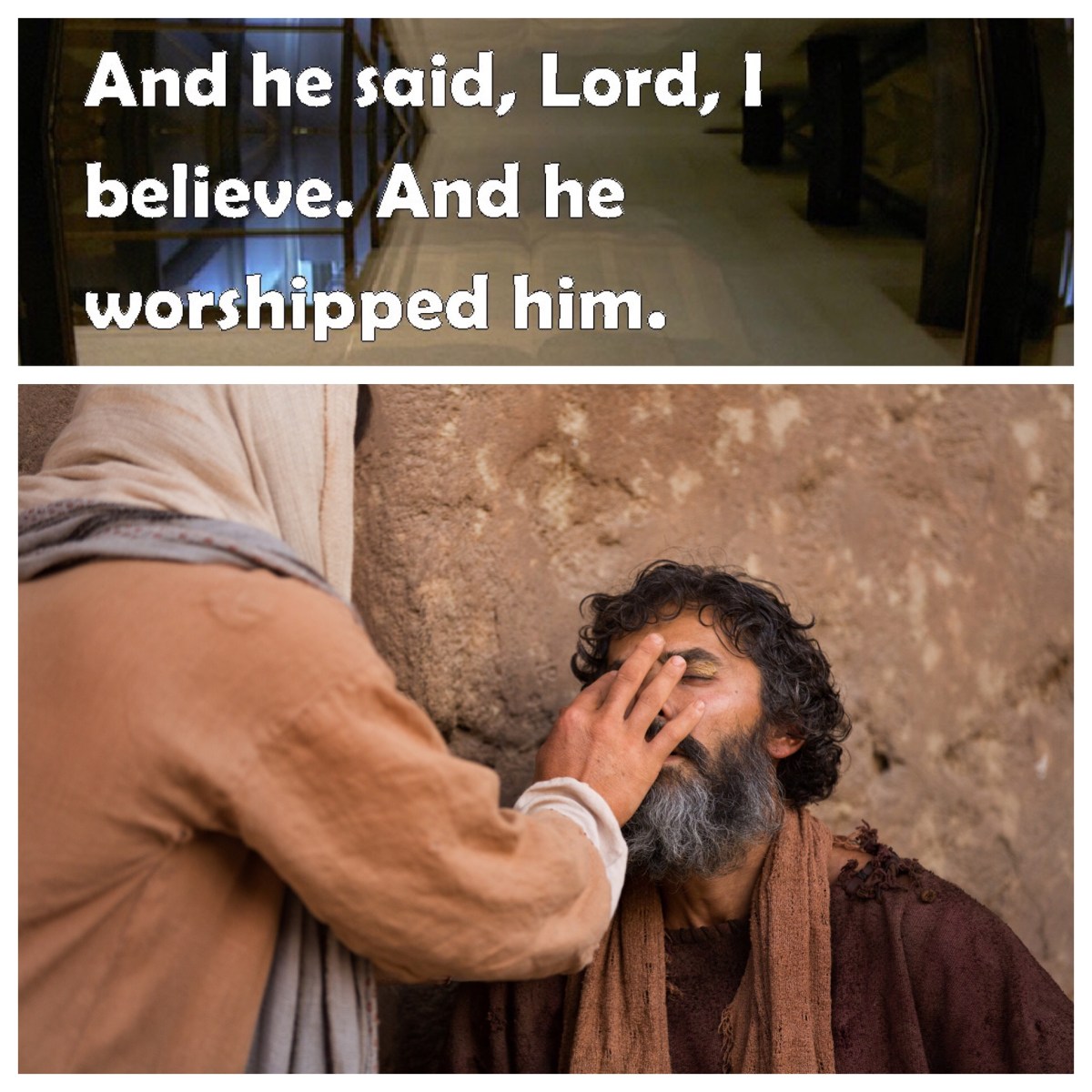“Lord, I believe.” And he worshiped him.
Who said this? Peter, the leader of the apostles? James and John, the sons of thunder, key leaders in the early Jesus movement? Paul, the self-proclaimed apostle of apostles?
None of these. These words come from a story told only in the book of signs (the fourth Gospel in our New Testament, usually identified as the Gospel according to John). The story concerns a resident of Jerusalem who was born blind, and lived his life into adulthood as a blind man who sat every day, negging for assistance, beside the pool of Siloam (John 9:1-41). This is the reading set in the lectionary for this coming Sunday.
And the person who utters these words of confession and faith? It was that very man, the man born blind (John 9:38). He makes this high confession of faith—a confession which stands alongside a number of other confessions of faith in this distinctive book of origins. And many of these confession are made by the most unlikely characters throughout this Gospel.
In the reading we had last Sunday, the woman who engaged in conversation with Jesus beside a well in Samaria, moves towards an understanding of Jesus as a prophet (4:19) and possibly the Messiah (4:25). The irony is that it is a woman, rather than a man, and a Samaritan, rather than a Galilean or Judean, who makes this confession.
This latter confession of Jesus as Messiah had already been declared by Andrew, a lesser-known apostle, a Galilean, the brother of Simon Peter (1:41). The former confession of Jesus as prophet is subsequently affirmed by a crowd of Galilean people (6:14). So the woman joins these characters in making confessions about Jesus.
As a result of the witness which this woman made to the people of her city (4:28-29), she led her fellow Samaritans to make the ultimate confession of Jesus: “we know that this is truly the Saviour of the world” (4:42). The irony is intensified; the first instance of widespread faith in Jesus comes from a group of Samaritans—those despised and regarded as outcasts, by the Judean and Galilean Jews.
The disciples of Jesus, by contrast, having heard the testimony of these Samaritans (4:42), as well as that of the Galilean crowd (6:14), can only complain about the words of Jesus: “This teaching is difficult; who can accept it?” (6:60).
That offers an interesting contrasting: these unnamed Samaritans recognise Jesus, but his disciples, known to us by name, cannot grasp what he is offering.
There is clear insight into the identity and significance of Jesus which continues to be offered by a collection of unlikely characters in the Johannine story. On one trip to Jerusalem, people in the crowd have a better insight into Jesus than the Pharisees. The Pharisees join with the temple authorities in a growing antagonism towards Jesus, but the crowd wonders, “When the Messiah comes, will he do more signs than this man has done?” (7:31).
Later, some in the crowd recognise Jesus as the prophet (7:40), and others, as the Messiah (7:41). The temple police recognise that Jesus is different (7:46), but the Pharisees dismiss this, saying to them, “Surely you have not been deceived too, have you?” (7:47). The difference in understanding is clear.
As the narrative continues, the antagonism of some in the crowd grows, to the point that they accuse Jesus: “Are we not right in saying that you are a Samaritan and have a demon?” (8:48). Then, they prepare to stone Jesus (8:59). Who he is provokes antagonism and opposition. To align with him is to step into that dangerous place.
That is the immediate context for the encounter that is then narrated, involving the man born blind, his parents, the Jewish authorities, Jesus, and his followers. Confessing faith in such a context is a fraught, risky, dangerous enterprise.
And yet, this anonymous man, blinded and beggared, does precisely this. And he stands with a most unlikely collection of people who recognise something special in Jesus: a Samaritan woman, a mourning sister (Martha), various crowds in Samaria, in Galilee, and in Jerusalem; and even, to some degree, the temple police in Jerusalem. How ironic.
“Lord, I believe”, he said. And he worshiped him. (John 9:38)
*************
This blog draws on material in JOURNEYING WITH JOHN: an exploration of the Johannine writings, by Elizabeth Raine and John Squires (self-published 2014)
https://johntsquires.com/2020/03/10/the-pharisee-of-jerusalem-and-the-woman-of-samaria-john-3-and-4/


One thought on “In the most unlikely company: confessing faith in Jesus (John 9; Lent 4A)”